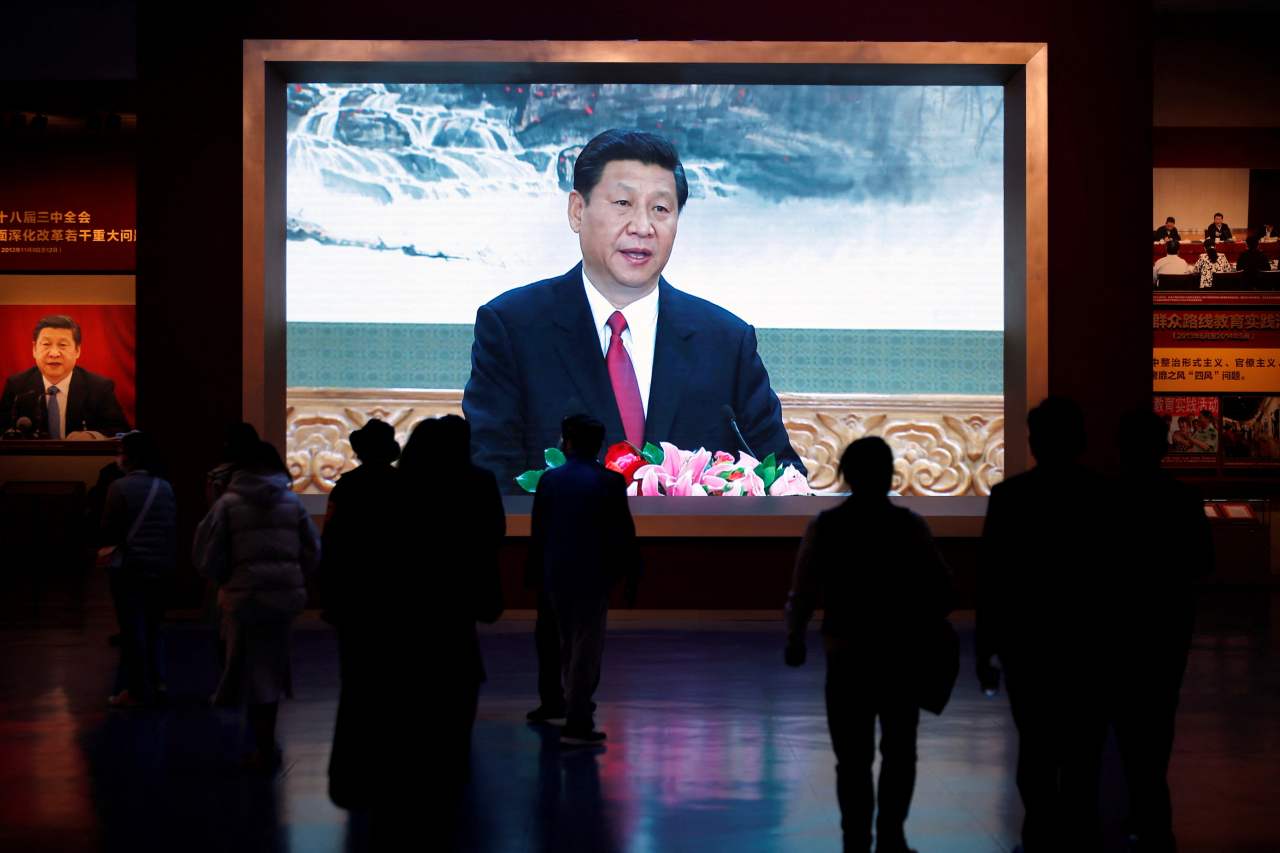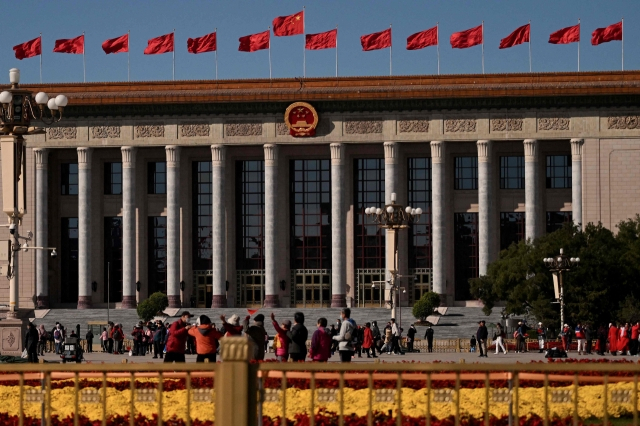[News Focus] Xi's 3rd term to raise geopolitical pressure for Seoul, experts say
Xi's third term in office would intensify US-China dispute, rise as destabilizing factor for Korean Peninsula
By Jo He-rimPublished : Oct. 13, 2022 - 17:37

Chinese President Xi Jinping appears set on course to take an unprecedented third term in office at the upcoming Communist Party Congress, and his reappointment would likely ramp up geopolitical pressure for Seoul, experts here said Thursday.
The experts also forecast that Xi's hawkish stance toward the US will only intensify the already heightened tensions between the two countries. This in turn will place South Korea in a more difficult position as the two superpowers would likely raise pressure for Seoul to take a side in many sensitive issues where they clash.
Xi's plan to rule for life?
The Chinese Communist Party’s National Congress is set to kick off on Sunday, for a conclave that is about a week long and held every five years.
Bringing together some 2,300 carefully chosen party members or delegates representing more than 96 million Communist Party members nationwide, the congress discusses policies for the country’s next five years and appoints new leaders.
This year, the congress is expected to be a coronation for Xi, who has eliminated all hurdles to a third term in office for the party’s general secretary and state chief.
According to the Global Times, Beijing's state-operated English media, the congress would serve as the platform for China's main party to review its work and major achievements over the past five years under the leadership of Xi.
On Oct. 9, the party's 19th Central Committee held its seventh plenary session to round up a work report, which highlighted the need to secure Xi's leadership, calling it the "dearest wish" of the people, to deliver it to the 20th Central Committee that will be formed in the upcoming congress.
The report stated that the upcoming Communist Party Congress should establish Xi's core position in the party and uphold Xi's "Thought on Socialism With Chinese Characteristics for a New Era" -- virtually confirming Xi's reelection as head of state.
The preliminary work for Xi to extend his leadership appears to have started years earlier, when Xi did not recommend a potential successor to the standing committee that was expected in the last congress in 2017. That was when Xi kicked off his second term, which would have been his last.
In the following year, Xi pushed for the country's rubber-stamp parliament to pass the controversial constitutional amendment that removed the restriction limiting the presidency to two consecutive five-year terms.
Xi, 69, would also be breaking the party’s informal age limit as well, by taking office for the third term.
With the legal boundaries eliminated, Xi may intend to achieve a lifelong tenure. So who will be elected to form the new 20th Central Committee is a critical indicator, as it would show whether Xi has made concessions or taken absolute power over the party and the state, observers say.

Greater pressure on South Korea
While Xi may have maintained a low profile over the past few months to allow for a smooth transition toward his reappointment, he may be more active to speak out on sensitive issues and ramp up pressure on countries that side with the United States, including South Korea, according to Kang Jun-young, a Chinese studies professor at Hankuk University of Foreign Studies.
"It is highly likely for Xi to raise a stronger voice against South Korea for its dependence on the US," Kang said.
With Xi expected to cement his leadership on Sunday for the next five years or possibly more, he will likely send stronger messages to deter Seoul from leaning further toward the US, said Park Won-gon, a professor in the department of North Korean studies at Ewha Womans University.
"Overall, (Xi's third term in office) would play negatively not only for the Korean Peninsula, but also for the entire world order. It would play unfavorably for South Korea's economy and security as well,"
"Up until now, China has been quite soft on Seoul's new government, even though the Yoon Suk-yeol administration has been actively participating in US-led movements aimed at keeping China in check."
South Korea and China have been at odds over a series of security issues, including Seoul's deployment of the US-made Terminal High Altitude Area Defense anti-missile system since 2017.
Relations continue to be frayed as the incumbent Yoon Suk-yeol administration has made clear its determination to bolster the alliance with the US, joining a series of international groupings led by Washington, such as the Indo-Pacific Economic Framework initiative that aims to contain Beijing's influence.
Wi Sung-rak, a former South Korean ambassador to Russia, said there may not be immediate changes to China's attitude toward South Korea.
But as China's conflict deepens with the US, Xi would likely make more detailed demands of South Korea. So Seoul should establish a consistent direction in its diplomatic policy for China, Wi said.
He also said Beijing would become less committed to holding back Pyongyang's nuclear ambitions, as it would want a stronger bond with its ally to counter the US' influence in the region.
Xi's unprecedented third term also signals a shift in China's political system, Park said.
While the socialist nature of the Chinese government has concentrated power in the central government, it still has run as a collective leadership system. Xi's consecutive terms in office would mean a shift of the system to authoritarianism led by an individual, Park said.
This would also be welcomed by North Korea, as it would be able to utilize the ally’s case as a pretext to maintaining its own dictatorship.
“(Xi’s third term in office) would make its socialist ally China an authoritarian state, and North Korea would be able to justify its dictatorship. As Pyongyang likes to make a saga (of the leadership), it could cite that authoritarianism is a way to counter US imperialism, like China,” Park said.
Military tension
One of the most concerning parts of the US-China competition would be Xi’s will to reclaim control of Taiwan, against the will of the people, calling it a historic mission. In an action countering the Chinese leader’s ambition, the US president has also made clear multiple times that he would defend Taiwan in case China attacks the island.
While any kind of physical clash related to Taiwan is unwanted, such a situation would be a major concern for South Korea, where the 28,500-strong US Forces Korea is stationed, the experts agreed.
How much South Korea would be involved in a military dispute regarding Taiwan would depend on the harshness of a clash between the US and China.
But as USFK is under the control of the US Indo-Pacific Command aimed at keeping China in check, there is a high possibility the troops stationed in Korea would be deployed to cover Taiwan, together with US Forces in Japan, the experts predicted.
“In case the USFK is moved out of South Korea to be deployed in Taiwan, the power vacuum could pose a great security problem to South Korea. North Korea could miscalculate the situation to act up, thinking all efforts are concentrated on Taiwan,” Kang of HUFS said.
At the same time, Kang said it would be wise for South Korea to distinguish the messages it sends to China in addressing common values such as human rights.
"It is only normal for South Korea, as a nation promoting the common values of democracy, freedom and openness to speak against violations of those values, and human rights. But the country should be able to distinguish the messages it sends to China, on multilateral stages and in bilateral relations," Kang added.
By Jo He-rim (herim@heraldcorp.com)









![[Kim Seong-kon] Democracy and the future of South Korea](http://res.heraldm.com/phpwas/restmb_idxmake.php?idx=644&simg=/content/image/2024/04/16/20240416050802_0.jpg&u=)








![[KH Explains] Hyundai's full hybrid edge to pay off amid slow transition to pure EVs](http://res.heraldm.com/phpwas/restmb_idxmake.php?idx=652&simg=/content/image/2024/04/18/20240418050645_0.jpg&u=20240418181020)

![[Today’s K-pop] Zico drops snippet of collaboration with Jennie](http://res.heraldm.com/phpwas/restmb_idxmake.php?idx=642&simg=/content/image/2024/04/18/20240418050702_0.jpg&u=)